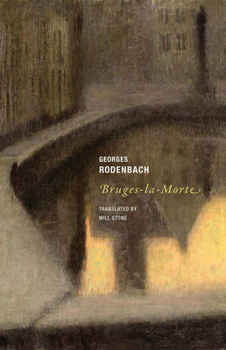Bruges-La-Morte
Select Format
Select Condition 
Book Overview
The archetypal Symbolist novel, and a gorgeous tapestry of death and melancholy, Bruges-la-Morte was also the first work of fiction to employ photographs in the style of Breton, Drndic and Sebald A widower, Hugues Viane, takes refuge in the decay of Bruges, living among the relics of his dead wife as he transforms his home and the very city he inhabits into her spatial embalmment. Spinning out his existence in a mournful,...
Format:Paperback
Language:English
ISBN:1939663814
ISBN13:9781939663818
Release Date:August 2022
Publisher:Wakefield Press
Length:160 Pages
Weight:0.35 lbs.
Dimensions:0.5" x 4.5" x 7.0"
Customer Reviews
4 ratings
Quite Theatrical
Published by Thriftbooks.com User , 14 years ago
Quality and delivery of the book were impeccable, though tracking was not available. The book is quite interesting to read. Perhaps not mainly because of the actual plot but the style - It feels like a play for the Theatre and Bruges as the city is one of the characters.
Death of Passion
Published by Thriftbooks.com User , 16 years ago
Bruges-la-Morte is a short, 100-page novella about compensation for death and the loss of love through the loss of love and death. The story is perfectly fin-de-siècle both in its dark, self-indulgent central figure, Hugues Viane, and in the voluptuousness of its writing. Bruges participates fully in the decadence of the narrative--the decaying propriety of the city with its small-minded, voyeuristic residents provides a material manifestation of Viane's own moral character. The culmination of the action of the narrative in the context of the city's annual Procession of the Holy Blood reveals the parallel spectacularity and decay of both medieval and modern passion. Less for vacation beach-reading, perfect for a lonely winter train journey.
Mourning in a mournful town
Published by Thriftbooks.com User , 16 years ago
In the Middle Ages Bruges was a bustling and sumptuous international trading city; today it is a tourist centre, with fake medieval banners fluttering brightly from lamp-posts. But in 1475 the river Zwijn which had connected it with the North Sea dried up as the latter suddenly receded; the town's prosperity died away; its quais were deserted; all so much so that by the 1890s it was known as Bruges-la-Morte. It had - so at least Rodenbach perceived it in 1892 - become a sleepy, pious city under mournful grey skies, with the dominant colours being the black robes of the clergy, the white head-dresses of the nuns who live in the `mystic enclosure' of the Beguinage, and the white swans on the canals. When Hugues Viane, the chief character in the novel, lost his beloved young wife, he decided to settle and shut himself away in Bruges because the dead town corresponded to his dead wife and because its atmosphere matched his inconsolable grief. Then one day, just as he was beginning to have difficulties in recalling his wife's features, he sees a woman in the street who is so much the absolute image of his dead wife that he pursues her. He rents a house in which he instals Jane as his mistress without at first feeling that he was being unfaithful to the cherished memory of his wife. After a while, it all goes horribly wrong as Jane's coarse nature diverges more and more from that of his wife; but by that time he cannot free himself from the erotic (and now experienced as the sinful) thrall into which he has fallen; and the end is terrible. It is quite a powerful novella. It is told poetically against the pervasive atmosphere of the town which itself is a character in the story. When the book first appeared, it was illustrated by 35 half-tone photographs of Bruges. This edition has new black-and-white photographs, but since none of them was taken in sunlight, they have the grey look which goes well with the text to which they refer.
A haunting read...
Published by Thriftbooks.com User , 16 years ago
Bruges-La-Morte by Georges Rodenbach is one of those minor pieces of world literature that can have a major effect on the reader. It is not a sublime work of art, it is not an epic, nor is it a treatise expounding on some political thought. At best it is a book for a moody afternoon, the story is laden in the overcast of a melancholy dreaming, a yearning. The above review gives a good description of the story. A man has lost his wife. He moves to Bruges. His is a lonely life. He has a housekeeper but they are not the best of friends. One day he sees a woman resembling his dead wife. He courts her, longs for her, knows she is nothing like his wife in spirit and yet wants to refine her in his own way. The beauty of this novel is in the pathos of the main character. A man in mourning who cannot let go of the past dooms himself. The photographs within the book add to the atomsphere. The streets are empty, the canals are empty, the world feels empty while you read this book. Again, it is not an epic piece of world literature but like an ominous dream, it lingers in the mind and heart. There are few novels or novellas out there that can haunt your life after you read it. This is one of them.






